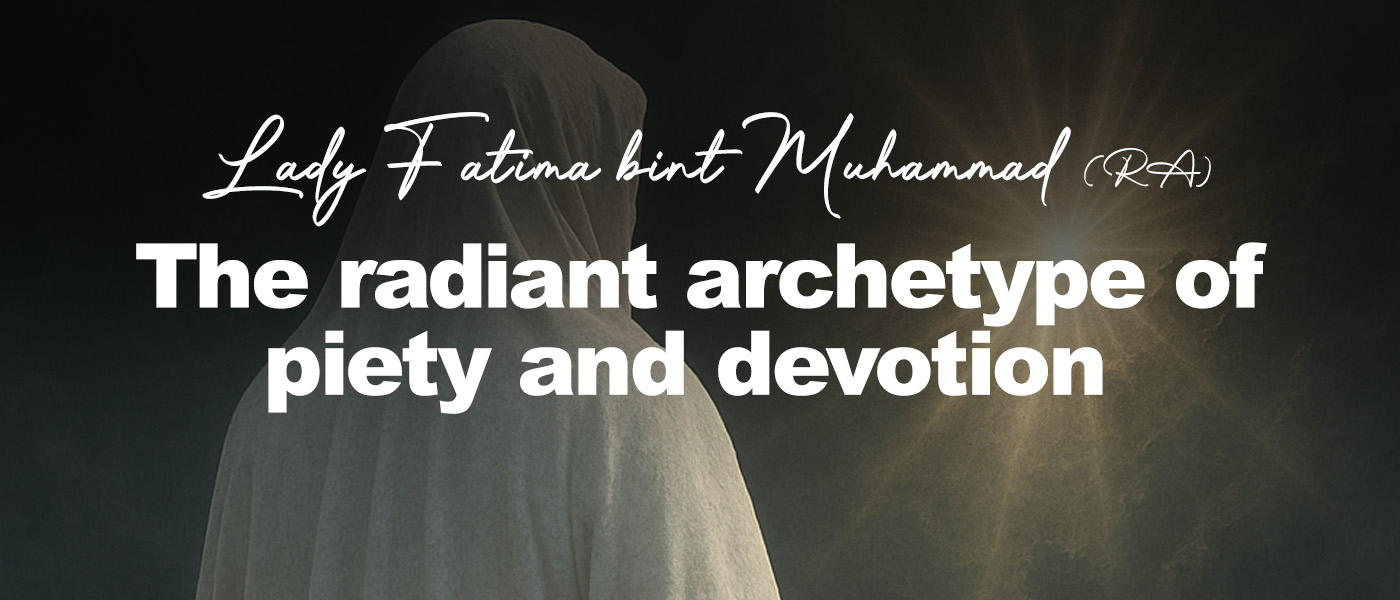
Have you ever known someone who lived their life unseen – hidden behind a veil of modesty and humility – yet is revered by billions across centuries and continents?
In the tapestry of Islamic history, among the figures who command profound reverence is Lady Fatima bint Muhammad (RA), known by her honorific al-Zahra, “the Radiant”. As the daughter of the Prophet Muhammad (SAW) and his first and beloved wife Lady Khadija bint Khuwaylid (RA), Lady Fatima bint Muhammad (RA) was born into the noblest lineage and occupies a remarkable position in Islamic history. Her life, though brief, is a profound testament to devotion, resilience, and moral clarity, making her a timeless exemplar of faith and fortitude.
Early Life
Lady Fatima bint Muhammad (RA) entered a world forged by revelation and resistance. She was raised under the guidance of both a pioneering mother and the greatest of all creation (SAW), experiencing trials that would leave an indelible mark on her spirit. Her childhood was not one of indulgence – it was shaped by sacrifice and service. Indeed, Lady Fatima (RA) grew up during the early years of Islam when the Quraysh were growing hostile, and her father was already bearing the weight of divine revelation.
As a child, Lady Fatima bint Muhammad (RA) witnessed her father being humiliated by Quraysh leaders who placed camel entrails on his back during prayer. She rushed to remove the filth and comfort him. This act of courage and compassion earned her the title Umm Abiha (Mother of Her Father) – a reflection of her nurturing presence and emotional closeness to the Prophet (SAW).
Spiritual Eminence: Sayyidat Nisa al-Jannah
And, while she was known by many esteemed names in terms of this world, her spiritual stature, too, was made clear when the Prophet (SAW) declared:
❝Fatima is the leader of the women of Paradise.❞
This statement sufficiently encapsulates her elevated status in the afterlife and her role as a moral beacon for generations of believers – and is the reason she is known as Sayyidat Nisa al-Jannah.
A Life of Service and Dhikr
Having grown up in a household of divine love and prophetic manners, Lady Fatima bint Muhammad (RA) remained ever-humble, never allowing others to be in service of her but always being in service of others. Her hands had become rough from grinding grain, her clothes were patched with her own sewed stitches, and she would often fall asleep hungry after willingly giving away the bread that she would make. Between having a servant to help with the chores and dhikr to ease the burden of household work, she chose the latter and the Prophet (SAW) gifted to her what we now know as Tasbeeh-e-Fatima: the dhikr of SubhanAllah, Alhamdulillah, and Allahu Akbar, a tradition that many Muslims continue to this day after praying their salah.
The Prophet’s (SAW) Unique Love for His Daughter
The Prophet (SAW) loved Lady Fatima (RA) in a way that was beautiful and pure. He (SAW) once said,
❝Fatima is a part of me. Whoever pleases her, pleases me. Whoever angers her, angers me.❞
This love was not just an ordinary sentiment, SubhanAllah, this was a divine connection. In fact, Lady Ayesha bint Abu Bakr (RA) is quoted to have said, “I did not see anyone who more resembled the Messenger of Allah, may Allah bless him and grant him peace, in words or speech and manner of sitting than Fatima. When she came to him, he stood up for her, made her welcome, kissed her forehead, and had her sit in his place. When the Prophet (SAW) came to her, she stood up for him, took his hand, made him welcome, kissed him, and made him sit in her place. She came to him during his final illness and he greeted her and kissed her.” (Al-Adab Al-Mufrad)
Marriage, Children, and Moral Legacy
She married Ali ibn Abi Talib (RA), the cousin of the Prophet (SAW) and one of the first to believe in Islam. The couple had four children: Hassan (RA), Hussain (RA), Lady Zainab (RA), and Lady Umm Kulthum (RA) and they instilled in them the values of justice, compassion, and steadfastness – qualities that would define their lives and inspire countless others. Lady Fatima bint Muhammad’s (RA) role as a mother to Hassan (RA) and Hussain (RA) further amplified her legacy, as both sons would later become pivotal figures in the moral and spiritual trajectory of Islam.
Lady Fatima bint Muhammad’s (RA) marriage to Ali ibn Abi Talib (RA) is often described as a union of virtue and divine wisdom. Despite their modest means, the couple’s home was a sanctuary of faith, humility, and service. Their lifestyle – marked by simplicity and sacrifice – embodied the Islamic ideal of asceticism and dedication.
The Whisper That Made Her Cry and Smile
One of the most tender and emotionally resonant moments in the life of Lady Fatima bint Muhammad (RA) occurred during the final illness of her father, the Prophet Muhammad (SAW). This moment is preserved in the authentic collections of hadith and offers a glimpse into the profound love and spiritual intimacy between father and daughter.
According to a narration by Lady Ayesha bint Abu Bakr (RA), “The Prophet (SAW) said, “Welcome, O my daughter!” Then he (SAW) made her sit on his right or on his left side, and then he (SAW) told her a secret and she started weeping. I asked her, “Why are you weeping?” He (SAW) again told her a secret and she started laughing. I said, “I never saw happiness so near to sadness as I saw today.” I asked her what the Prophet (SAW) had told her. She said, “I would never disclose the secret of Allah’s Messenger (SAW).” When the Prophet (SAW) died, I asked her about it. She replied. “The Prophet (SAW) said: ‘Every year, Jibraeel used to revise the Quran with me only once, but, this year, he has done so twice. I think this portends my death, and you will be the first of my family to follow me.’ So, I started weeping. Then he said. ‘Don’t you like to be the chief of all the ladies of Paradise or the chief of the believing women? So, I laughed for that.” (Sahih Bukhari)
This exchange is not only a testament to Lady Fatima’s (RA) closeness to the Prophet (SAW) but also to her spiritual stature. The promise that she would be the first to join him in the Hereafter and that she would be the leader of the women of Paradise (Sayyidat Nisa al-Jannah) affirms her elevated position in Islamic tradition.
Her tears reflected the human grief of impending loss; her smile, the serenity of divine reassurance. In that moment, Lady Fatima (RA) embodied both the emotional depth of a daughter and the spiritual grace of a woman chosen for eternal honor.
Her Final Wishes and Spiritual Distinction
Following the death of her father, Lady Fatima bint Muhammad (RA) continued to embody moral clarity and devotion. When her time was near, Lady Fatima bint Muhammad (RA) had requested that her funeral be held at night to preserve her modesty so none would see so much as a shadow of her figure, reflecting her deep commitment to Islamic values even in death. Subhan Allah – this is a level of modesty unthought of today. No doubt, it is among the reasons she is deemed one of the four women of perfect faith. Per Sahih Bukhari and Sahih Muslim, the Prophet (SAW) said:
❝Many men attained perfection but, among women, only Maryam bint Imran, Asiya the wife of Pharaoh, Khadijah bint Khuwaylid, and Fatima bint Muhammad.❞
This distinction places Lady Fatima bint Muhammad among the spiritual elite of humanity. Her early death was seen as a mercy and a fulfillment of the Prophet’s (SAW) prophecy, underscoring the significance of her being the first to reunite with him as a sign of her closeness to Allah (SWT) and her father.
A Radiant Blueprint for Ethical Living
Lady Fatima bint Muhammad’s (RA) life offers a blueprint for ethical living. Her example challenges believers to embody the principles by which she lived – faith, compassion, courage, and integrity. In each quiet act of service and every whispered remembrance of Allah (SWT), her legacy remains. She teaches us that greatness is not measured by power or wealth, but by how deeply one walks in the light of divine love. When given the option, she did not choose ease, she chose Allah (SWT). She did not choose this world, she chose akhirah. And, in return, Allah (SWT) chose her by elevating her status in this world and the hereafter.
Today, in a time when a woman’s value is reduced to appearance, status, or voice, Lady Fatima bint Muhammad (RA) reminds us that true worth lies in who you are when no one is looking, and how pleased Allah (SWT) Is with you. And her legacy teaches us that love for the Prophet (SAW) is not merely claimed, but lived, through character and sacrifice.
A Sincere Dua
As we reflect on her luminous life, let us raise our hands and hearts in prayer:
O Allah, the Most Merciful and Most Loving,
Shower Your choicest blessings upon Lady Fatima bint Muhammad (RA), the beloved daughter of Your Messenger (SAW), the embodiment of modesty and righteousness. Elevate her rank in the gardens of Paradise, illuminate her grave with Your light, and join her in the company of those You have favored.
Make us among those who walk in her footsteps with sincerity, compassion, and courage. Let her Tasbeeh be our strength in trials, her dignity our aspiration, and her love for You and Your Beloved Messenger (SAW) the fire that purifies our hearts. May her radiant legacy continue to guide us toward the path of truth and serenity.
Ameen!


